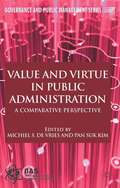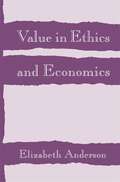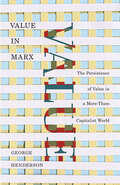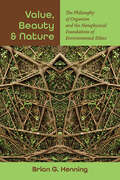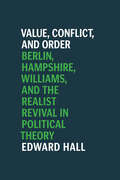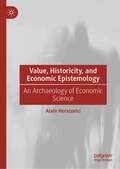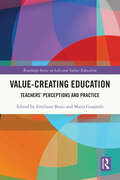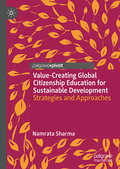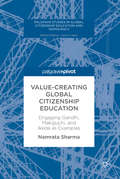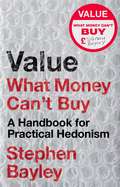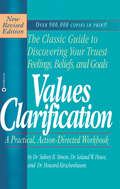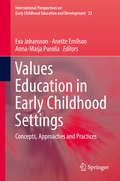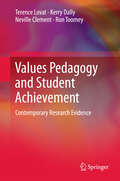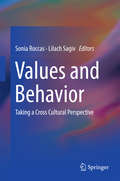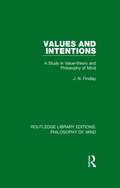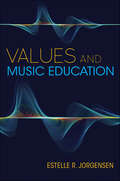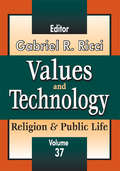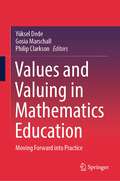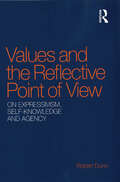- Table View
- List View
Value and Understanding: Essays for Peter Winch
by Raimond GaitaThe voices in this volume, those of philosophers from Britain, Europe, America and Australia, speak in different tones of sumpathy and criticism of Winch and his conception of human conditioning.
Value and Virtue in Public Administration: A Comparative Perspective
by Michiel S. De Vries Pan Suk KimA multidisciplinary analysis of the role of values and virtue in public administration, this book calls for a rediscovery of virtue. It explores ways of enabling the public sector to balance the values that are presently dominant with classic values such as accountability, representation, equality, neutrality, transparency and the public interest.
Value in Ethics and Economics
by Elizabeth AndersonElizabeth Anderson offers a new theory of value and rationality that rejects cost-benefit analysis in our social lives and in our ethical theories. This account of the plurality of values thus offers a new approach, beyond welfare economics and traditional theories of justice, for assessing the ethical limitations of the market. In this light, Anderson discusses several contemporary controversies involving the proper scope of the market, including commercial surrogate motherhood, privatization of public services, and the application of cost-benefit analysis to issues of environmental protection.Table of Contents: Preface 1. A Pluralist Theory of Value A Rational Attitude Theory of Value Ideals and Self-Assessment How Goods Differ in Kind (I): Different Modes of Valuation How Goods Differ in Kind (II): Social Relations of Realization 2. An Expressive Theory of Rational Action Value and Rational Action The Framing of Decisions The Extrinsic Value of States of Affairs Consequentialism Practical Reason and the Unity of the Self 3. Pluralism and Incommensurable Goods The Advantages of Consequentialism A Pragmatic Theory of Comparative Value Judgments Incommensurable Goods Rational Choice among Incommensurable Goods 4. Self-Understanding, the Hierarchy of Values, and Moral Constraints The Test of Self-Understanding The Hierarchy of Values Agent-Centered Restrictions Hybrid Consequentialism A Self-Effacing Theory of Practical Reason? 5. Criticism, Justification, and Common Sense A Pragmatic Account of Objectivity The Thick Conceptual Structure of the Space of Reasons How Common Sense Can Be Self-Critical Why We Should Ignore Skeptical Challenges to Common Sense 6. Monistic Theories of Value Monism Moore's Aesthetic Monism Hedonism Rational Desire Theory 7. The Ethical Limitations of the Market Pluralism, Freedom, and Liberal Politics The Ideals and Social Relations of the Modern Market Civil Society and the Market Personal Relations and the Market Political Goods and the Market The Limitations of Market Ideologies 8. Is Women's Labor a Commodity? The Case of Commercial Surrogate Motherhood Children as Commodities Women's Labor as a Commodity Contract Pregnancy and the Status of Women Contract Pregnancy, Freedom, and the Law 9. Cost-Benefit Analysis, Safety, and Environmental Quality Cost-Benefit Analysis as a Form of Commodification Autonomy, Labor Markets, and the Value of Life Citizens, Consumers, and the Value of the Environment Toward Democratic Alternatives to Cost-Benefit Analysis Conclusion Notes References Index Reviews of this book: Anderson is anxious to combat what she sees as a tendency for commercial values to invade areas of human life where they do not belong...A useful contribution to debate about the proper scope of the market. "Not everything is a commodity, insists Anderson, and her brief should shake up social science technocrats." --Philadelphia Inquirer "The book is rich in both argument and application." --Alan Hamlin, Times Higher Education Supplement "In this rich and insightful book Elizabeth Anderson develops an original account of value and rational action and then employs this account to address the pragmatic political question of what the proper range of the market should be. Anderson's principal targets are consequentialism, monism and the crude 'economistic' reasoning which underpins much contemporary social policy...This is an important book...For anyone interested in political philosophy this is essential reading." --A. J. Walsh, Australasian Journal of Philosophy--Hugo Dixon, Financial Times [UK]Reviews of this book: Not everything is a commodity, insi
Value in Marx: The Persistence of Value in a More-Than-Capitalist World
by George HendersonLong prone to dogmatic disagreement, the question of value in Marx&’s thought—what value is, the purpose it serves, its application to real-world capitalism—requires renewal if Marx&’s work is to remain vibrant. In Value in Marx, George Henderson offers a lucid rereading of Marx that strips value of its turgid theoretical reduction and reframes it as an investigation into the tensions between social relations and forms as they are rather than as what they could otherwise become.Drawing on Marx&’s Capital and Grundrisse, Henderson shows how these volumes do not harbor a single theory of value that equates value to capital. Instead, these books experimentally compose and recompose value for a world that is more than capitalist. At stake is how Marx conceives of human freedom, of balanced social arrangements, and of control over the things people produce. Henderson finds that the limits on social becoming, including the tendency toward alienated existence, haunt Marx even as he looks beyond the critique of capital to an emancipated society to come. Can these limits be confronted in a creative, even joyful, way? Can they become aspects of what we desire, rather than being silenced and denied? As long as we persist in interpreting value broadly, following it as an active and not a shut-down, predetermined feature of Marx&’s texts, Henderson ultimately views Marx as responding positively to these challenges and employing value as a powerful tool of the political imaginary.
Value, Beauty, and Nature: The Philosophy of Organism and the Metaphysical Foundations of Environmental Ethics (SUNY series in Environmental Philosophy and Ethics)
by Brian G. HenningMuch of early environmental ethics was born out of the belief that the ecological crisis can only truly be solved by overcoming a pernicious worldview that limits all intrinsic value to human beings. Returning to this originating impulse, Value, Beauty, and Nature contends that, to make progress within environmental ethics, philosophers must explicitly engage in environmental metaphysics. Grounded in an organicist process worldview, Brian G. Henning shows that it is possible to make progress in key debates within environmental philosophy, including those concerning the nature of intrinsic value; anthropocentrism; hierarchy; the moral significance of beauty; the nature of individuality; teleology and the naturalistic fallacy; and worldview reconstruction. A Whiteheadian fallibilistic, naturalistic, event ontology allows for the recovery of systematic, speculative metaphysical thought without a revanchist movement toward a necessitarian philosophia perennis. Thus, in contrast to the claims of environmental pragmatists, Value, Beauty, and Nature demonstrates that environmental ethics would greatly benefit from an adequate metaphysical foundation and, of the candidate metaphysical systems, Alfred North Whitehead's philosophy of organism is the most adequate.
Value, Conflict, and Order: Berlin, Hampshire, Williams, and the Realist Revival in Political Theory
by Edward HallIs the purpose of political philosophy to articulate the moral values that political regimes would realize in a virtually perfect world and show what that implies for the way we should behave toward one another? That model of political philosophy, driven by an effort to draw a picture of an ideal political society, is familiar from the approach of John Rawls and others. Or is political philosophy more useful if it takes the world as it is, acknowledging the existence of various morally non-ideal political realities, and asks how people can live together nonetheless?The latter approach is advocated by “realist” thinkers in contemporary political philosophy. In Value, Conflict, and Order, Edward Hall builds on the work of Isaiah Berlin, Stuart Hampshire, and Bernard Williams in order to establish a political realist’s theory of politics for the twenty-first century. The realist approach, Hall argues, helps us make sense of the nature of moral and political conflict, the ethics of compromising with adversaries and opponents, and the character of political legitimacy. In an era when democratic political systems all over the world are riven by conflict over values and interests, Hall’s conception is bracing and timely.
Value, Historicity, and Economic Epistemology: An Archaeology of Economic Science
by Alain HerscoviciThis book aims to study, from an approach linked to epistemology and the history of ideas, the evolution of economic science and its differing seminal systems. Today mainstream economics solves certain problems chosen within the scope of “normal science,” without questioning the epistemological foundations that support the paradigm within which they were conceived. Contrary to a Neoclassical interpretation, the historicist interpretation shows that, from the incommensurability of the different paradigms, it is impossible to conceive of a progress of economic science, in a long-term perspective. This book ultimately reveals, from the different economic schools of thought analyzed, that there is no pure form of episteme, or system of understanding. Each concrete episteme in the history of economic thought is by nature hybrid in the sense that it contains components from preceding systems of knowledge.
Value-Based Civilization: A New Era of Human Civilization (Understanding China)
by Lijin YanValue-based Civilization revolutionizes civilization studies by spotlighting human values as civilization's core and technology as its propelling force. The book's trailblazing "Human Civilization Function" model and "Value-Based Civilization" formula provide incisive tools for understanding civilizational evolution, from ancient agriculture to modern digital eras. This work offers a rich, multidimensional analysis, seamlessly integrating digital transformations with historical human development trajectories. It masterfully dissects how technological progress intertwines with societal values, uncovering underlying patterns that have shaped civilizations over time. One of its greatest strengths lies in translating intricate concepts about value systems and technological shifts into engaging, easy - to - understand content. This makes profound insights into humanity's future accessible to all readers, whether scholars, professionals, or those simply curious about the world. A must - read for anyone seeking to grasp the dynamics of our rapidly evolving civilization.
Value-Creating Education: Teachers’ Perceptions and Practice (Routledge Series on Life and Values Education)
by Emiliano Bosio Maria GuajardoOffering a pivotal reference point and a wide range of global perspectives of teaching experiences on value-creating education (VCE), this book is a timely spotlight on contemporary issues of globalisation that many educational institutions around the world may encounter. It contributes to the originality of constructing new knowledge in the field of VCE, a forward-looking framework, and an ethical and educational imperative that can be understood in different ways, from diverse theoretical orientations. The chapters written by experienced international educators explore the following questions: How do educators understand the role of VCE? What pedagogical approaches to VCE do educators employ in their classes? How do educators support the values and knowledge of VCE in all curricular areas? What do educators see as the key essential values and knowledge that students should develop through VCE? It offers valuable insights and applied pedagogical practices for postgraduate students, researchers, educational policy makers, curriculum developers, and decision-makers in higher education institutions and non-governmental organizations (e.g., UNESCO, OXFAM).
Value-Creating Global Citizenship Education for Sustainable Development: Strategies and Approaches (Palgrave Studies in Global Citizenship Education and Democracy)
by Namrata SharmaThis volume brings together marginalized perspectives and communities into the mainstream discourse on education for sustainable development and global citizenship. Building on her earlier work, Sharma uses non-western perspectives to challenge dominant agendas and the underlying Western worldview in the UNESCO led discourse on global citizenship education. Chapters develop the theoretical framework around the three domains of learning within the global citizenship education conceptual dimensions of UNESCO--the cognitive, socio-emotional, and behavioral--and offer practical insights for educators. Value-creating global citizenship education is offered as a pedagogical approach to education for sustainable development and global citizenship in addition to and complementing other approaches mentioned within the recent UNESCO guidelines.
Value-Creating Global Citizenship Education: Engaging Gandhi, Makiguchi, And Ikeda As Examples (Palgrave Studies In Global Citizenship Education And Democracy Ser.)
by Namrata SharmaThis book fills an existing gap within the practice of global citizenship education by offering Asian perspectives. In this book, Soka or value-creating education developed by the Japanese educators, Tsunesaburo Makiguchi (1871-1944) and Daisaku Ikeda (b. 1928) is compared to the ideas of the Indian political leader Mahatma Gandhi (1869-1948). This study of their respective thoughts and movements has a significant bearing on the three domains of learning within the global citizenship education conceptual dimensions of UNESCO – the cognitive, socio-emotional, and behavioral. This book deftly combines theoretical discussions with themes and suggestions for practice and future research.
Value-Free Science? Purity and Power in Modern Knowledge
by Robert N. ProctorWhy have scientists shied away from politics, or defended their work as value free? How has the ideal of neutrality come to dominate the world of science? These are some of the central questions that Robert Proctor addresses in his study of the politics of modern science.<P><P> Value-Free Science? emphasizes the importance of understanding the political origins and impact of scientific ideas. Proctor lucidly demonstrates how value-neutrality is a reaction to larger political developments, including the use of science by government and industry, the specialization of professional disciplines, and the efforts to stifle intellectual freedoms or to politicize the world of the academy.<P> The first part of the book traces the origins of value-neutrality prior to the eighteenth century. Plato and Aristotle saw contemplative thought as superior to practical action, and this separation of theory and practice is still invoked today in defense of "neutral science." In the seventeenth century the Baconian search for useful knowledge allowed a new and closer tie between theory and practice, but it also isolated moral knowledge from natural philosophy. Another version of neutrality was introduced by the mechanical conception of the universe, in which the idea of a benevolent, human-centered cosmos was replaced with a "devalorized" view of nature.<P> The central part of the book explores the exclusion of politics and morals with the emergence of the social sciences. Proctor highlights the case of Germany, where the ideal of value-neutrality was first articulated in modern form by social scientists seeking to attack or defend Marxism, feminism, and other social movements. He traces the rise and fall of positivist ethical and economic theory, showing that arguments for value-free science often mask concrete political maneuvers. Finally, he reviews critiques of science that have been voiced in recent debates over critical issues in agricultural science, military research, health and medicine, and biological determinism.<P> This provocative book will interest anyone seeking ways to reconcile the ideals of scientific freedom and social responsibility.
Value: What Money Can't Buy: A Handbook for Practical Hedonism
by Stephen BayleySince the industrial revolution, when everything ran by clockwork, people have understood how important it is to live in the moment. But over time our world has grown increasingly busy, and we've lost our ability to truly savour each unique experience and the simple pleasures the world has to offer. Cultural commentator and critic Stephen Bayley seeks to explain what real value is: it's about taking the time and making the effort to appreciate things, of understanding the permanent charm of modest daily rituals performed with care and feeling. Of caring about appearances and meaning. Of being bold in matters of taste. Of fully understanding the source of lasting pleasure. Of making every encounter with an object or person meaningful.Value is an elegiac account of what's recently been lost in the digital apocalypse. But also an enthusiastic anticipation of what we can regain in a post-viral, more analogue and more thoughtful world.
Value: What Money Can't Buy: A Handbook for Practical Hedonism
by Stephen BayleySince the industrial revolution, when everything ran by clockwork, people have understood how important it is to live in the moment. But over time our world has grown increasingly busy, and we've lost our ability to truly savour each unique experience and the simple pleasures the world has to offer. Cultural commentator and critic Stephen Bayley seeks to explain what real value is: it's about taking the time and making the effort to appreciate things, of understanding the permanent charm of modest daily rituals performed with care and feeling. Of caring about appearances and meaning. Of being bold in matters of taste. Of fully understanding the source of lasting pleasure. Of making every encounter with an object or person meaningful.Value is an elegiac account of what's recently been lost in the digital apocalypse. But also an enthusiastic anticipation of what we can regain in a post-viral, more analogue and more thoughtful world.
Values Clarification: A Practical, Action-Directed Workbook
by Howard Kirschenbaum Sidney B. Simon Leland W HoweAre you getting what you want out of life? Do you know where you draw the line when it comes to sex, money, cheating on your income tax ... or accepting an indecent proposal? Becoming aware of your values is the key to making wise choices in all aspects of your life, from picking a partner to buying a house. Created by Dr. Sidney Simon, coauthor of the bestselling Getting Unstuck, and two other leading professionals, this workbook has already had an impact on hundreds of thousands of lives. Its scores of intriguing, interactive exercises were designed to uncover the hidden beliefs that reveal what matters most to you, how you deal with life-changing conflicts, which career choices will make you happiest, what leisure time activities provide you with the most pleasure, where you honestly stand on controversial issues, what day-to-day events are likely to make you angry ... excited ... anxious ... confident, how best to motivate yourself, and what beliefs can cause conflict in your family or love relationship.
Values Education in Early Childhood Settings: Concepts, Approaches And Practices (International Perspectives on Early Childhood Education and Development #23)
by Eva Johansson Anette Emilson Anna-Maija PuroilaThis book is about values education in early years settings and discusses theory and concepts, as well as methodological and empirical perspectives. It explores issues such as the kinds of values that are communicated between educators and children and the kind of future citizens we foster in early childhood settings. It illustrates by way of cases involving many participants, including children, educators, and researchers, who have their roots in diverse contexts, and reside in different parts of the world, including Australia, Denmark, Finland, Iceland, Norway, Slovenia, and Sweden. The book carefully considers the contextualized character of the cases presented, yet argues that the questions, theories, and methodologies emphasized do inform the international debate in manifold ways. Communication of values in a broad and diverse sense is central in any pedagogy, especially for the youngest children in the educational system. Still, values education has been neglected as a research field, in education in general and particularly in the early years. This book addresses this lack of knowledge by scrutinizing various questions about values education in ECEC settings.
Values Pedagogy and Student Achievement
by Terence Lovat Kerry Dally Neville Clement Ron ToomeyUnder the weight of a combination of forces, many of the older paradigms of learning are being questioned in our time. Among the updated research that elicits such critique is that which deals directly with effective pedagogy, clearly illustrating the enhanced effects on learning when it is dealt with as a holistic developmental enterprise rather than one concerned solely with content, technique and measurable outcomes. This research includes volumes of empirical evidence and conceptual analysis from across the globe that point to the inextricability of values as lying at the heart of those forms of good practice pedagogy that support and facilitate the species of student achievement that truly does transform the life chances of students. This research indicates that the combination of values rich learning environments and values discourse (that is, the holism of implicit and explicit pedagogy) has potential for positive influence on learning outcomes, most markedly for those deemed likely to fail without such pedagogical intervention. Values Pedagogy and Student Achievement - Contemporary Research Evidence uncovers, explores and appraises those volumes of evidence and analysis, illustrating their pertinence to student achievement, the vexed issue that lies at the heart of all for which education stands.
Values and Behavior
by Sonia Roccas Lilach SagivWhat are values? How are they different from attitudes, traits, and specific goals? How do our values influence our behavior, and vice versa? How does our culture and environment impact the relationship between values and behavior? These questions and more are rigorously examined by prominent and emerging scholars in this significant volume Values and Behavior: Taking A Cross Cultural Perspective. Personal values are cognitive representations of abstract, desirable motivational goals that guide the way individuals select actions, evaluate people and events, and explain their actions and evaluations. The unique features of values have implications for their impact on behavior. People are highly satisfied with their values and perceive them as close to their ideal selves. At the same time, however, daily interpersonal interaction reveals that individuals hold different, sometimes opposing, value profiles. These individual differences are even more apparent when individuals from different cultures interact. The collected chapters address the links between values and behavior from a cultural perspective. They review studies conducted in various cultures and discuss culture as a moderator of the relationships between values and behavior. Structurally, part I of the volume discusses what values are and how they should be measure; part II then examines the contents of the relationships between values and behavior in different life-domains, including prosocial behavior, aggression, behavior in organizations and relationships formation. Part III explores some of the moderating mechanisms that relate values to behavior. Taken together, these chapters review and synthesize over twenty years of research on values and behavior, and propose new insights that have important implications for both research and for practice.
Values and Intentions: A Study in Value-theory and Philosophy of Mind (Routledge Library Editions: Philosophy of Mind)
by J. N. FindlayProfessor Findlay in this book, originally published in 1961, set out to justify, and to some extent carry out, a ‘material value-ethic’, ie. A systematic setting forth of the ends of rational action. The book is in the tradition of Moore, Rashfall, Ross, Scheler and Hartmann though it avoids altogether dogmatic intuitive methods. It argues that an organised framework of ends of action follows from the attitude underlying our moral pronouncements, and that this framework, while allowing personal elaboration, is not a matter for individual decision. The relations connecting our fundamental value-judgements with one another, and the frames of mind behind them, are not rigorously deductive but are sufficiently compelling to be called logical. Something of a ‘transcendental deduction’ of a well-ordered family for our basic heads of valuation is both possible and necessary. The work is further critical of the notion of obligation which has been extended far beyond legal contracts and understandings. The book also contains a chapter on religion.
Values and Music Education (Counterpoints: Music and Education)
by Estelle R. JorgensenWhat values should form the foundation of music education? And once we decide on those values, how do we ensure we are acting on them?In Values and Music Education, esteemed author Estelle R. Jorgensen explores how values apply to the practice of music education. We may declare values, but they can be hard to see in action. Jorgensen examines nine quartets of related values and offers readers a roadmap for thinking constructively and critically about the values they hold. In doing so, she takes a broad view of both music and education while drawing on a wide sweep of multidisciplinary literature. Not only does Jorgensen demonstrate an analytical and dialectical philosophical approach to examining values, but she also seeks to show how theoretical and practical issues are interconnected.An important addition to the field of music education, Values and Music Education highlights values that have been forgotten or marginalized, underscores those that seem perennial, and illustrates how values can be double-edged swords.
Values and Technology: Religion and Public Life (Religion And Public Life Ser.)
by James BurkIn 1749 Jean-Jacques Rousseau's Discourse on the Arts and Sciences, surprised leading Enlightenment thinkers who had enthusiastically upheld the positive benefits of humanity's technological advance. Voltaire, who celebrated the ends of civilization, mocked Rousseau's praise for an original creative state of nature in which man enjoyed an optimum level of freedom.Given the unprecedented intrusion of technology into our lives, the question raised by Rousseau's critique may be even more pertinent. In this volume of Religion and Public Life contributors address some of the challenges to conventional morality brought on by the technological augmentation of the social structure. John Barker's essay explores how Luciano Floridi's philosophy of technology has complicated the conventional way of determining what ought to receive moral consideration. Fani Zlatarova provides a practical guide for incorporating ethical components into teaching computer technology.Grant Havers explores the controversies surrounding the biogenetic explosion through an examination of the competing philosophical perspectives and Christopher Vassilopolos examines the science-based justification for taking life. Gabriel R. Ricci looks at recent political history in the United States in order to highlight the sometimes uneasy relationship between science and social policy. Volume 37 is a welcome addition to the acclaimed Religion and Public Life series.
Values and Vaccine Refusal: Hard Questions in Ethics, Epistemology, and Health Care
by Mark NavinParents in the US and other societies are increasingly refusing to vaccinate their children, even though popular anti-vaccine myths – e.g. ‘vaccines cause autism’ – have been debunked. This book explains the epistemic and moral failures that lead some parents to refuse to vaccinate their children. First, some parents have good reasons not to defer to the expertise of physicians, and to rely instead upon their own judgments about how to care for their children. Unfortunately, epistemic self-reliance systematically distorts beliefs in areas of inquiry in which expertise is required (like vaccine immunology). Second, vaccine refusers and mainstream medical authorities are often committed to different values surrounding health and safety. For example, while vaccine advocates stress that vaccines have low rates of serious complications, vaccine refusers often resist vaccination because it is ‘unnatural’ and because they view vaccine-preventable diseases as a ‘natural’ part of childhood. Finally, parents who refuse vaccines rightly resist the utilitarian moral arguments – ‘for the greater good’ – that vaccine advocates sometimes make. Unfortunately, vaccine refusers also sometimes embrace a pernicious hyper-individualism that sanctions free-riding on herd immunity and that cultivates indifference to the interpersonal and social harms that unvaccinated persons may cause.
Values and Valuing in Mathematics Education: Moving Forward into Practice
by Philip Clarkson Yüksel Dede Gosia MarschallThis book is a follow-up to 'Values and Valuing in Mathematics Education: Scanning and Scoping the Territory' (2019, Springer). This book adds a critical emphasis on practice and fosters thinking concerning positive mathematical well-being, engagement, teacher noticing, and values alignment among a range of critical notions that intersect with values and valuing. Values and valuing play a key role in many aspects of education, such as assessment, planning, classroom interactions, choosing tasks, and general well-being. What one values and finds important in the learning and teaching of mathematics operates within the intersection of all social, cognitive, and affective aspects of school pedagogy, making values a significant holistic factor in education. The chapters explore potential teaching strategies that enhance the understanding of the central place of values in mathematics itself as a subject, as well as how values impact how mathematics is used withinsociety. This book includes examples of strategies for facilitating students’ meaningful engagement with, and conscious learning of, values when engaging in mathematical thinking and doing.
Values and the Reflective Point of View: On Expressivism, Self-Knowledge and Agency
by Robert DunnValues are inescapable. They pervade and shape our psychology, our agency, and our lives as reflective and self-knowing subjects. This book explores the crucial ways in which values figure within reflection and thereby shape our theoretical and practical lives, against the backdrop of an expressivist moral psychology that is sensitive to the vicissitudes of valuing. Combining a discussion of the role that values play within reflection with a critique of a range of influential contemporary views in moral psychology and the theory of agency, Dunn shows how such views obscure or distort the nature of that role and that there is a ’natural fit’ between an expressivist account of values and the best account of the role of values in the lives of reflective agents. Writers discussed include Simon Blackburn, Michael E. Bratman, Donald Davidson, Harry Frankfurt, Christine Korsgaard, Thomas Nagel and J. David Velleman. The book is also an important addition to the literature on self-knowledge. Dunn argues that, by reasoning about truth and values, we possess a unique, non-observational way of coming to know our own minds and hearts, together with what we are going to make happen in the world. The discussion criticizes recent contributions to the theory of self-knowledge by Richard Moran and J. David Velleman.
Values for a Post-Pandemic Future (Philosophy of Engineering and Technology #40)
by Jeroen van den Hoven Matthew J. Dennis Georgy Ishmaev Steven UmbrelloThis open access book shows how value sensitive design (VSD), responsible innovation, and comprehensive engineering can guide the rapid development of technological responses to the COVID-19 crisis. Responding to the ethical challenges of data-driven technologies and other tools requires thinking about values in the context of a pandemic as well as in a post-COVID world. Instilling values must be prioritized from the beginning, not only in the emergency response to the pandemic, but in how to proceed with new societal precedents materializing, new norms of health surveillance, and new public health requirements.The contributors with expertise in VSD bridge the gap between ethical acceptability and social acceptance. By addressing ethical acceptability and societal acceptance together, VSD guides COVID-technologies in a way that strengthens their ability to fight the virus, and outlines pathways for the resolution of moral dilemmas. This volume provides diachronic reflections on the crisis response to address long-term moral consequences in light of the post-pandemic future. Both contact-tracing apps and immunity passports must work in a multi-system environment, and will be required to succeed alongside institutions, incentive structures, regulatory bodies, and current legislation. This text appeals to students, researchers and importantly, professionals in the field.

